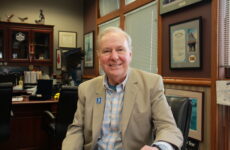
Professor Karen Christiansen
Note: This interview has been edited for length and clarity.
In honor of Women’s History Month, the Chronicle sat down with Karen Christiansen, a professor who teaches Gender, Media, and Sexuality at DMACC. In this interview, we discussed gender, equity, and feminist ideology.
What is feminism to you?
I really like bell hooks’s definition. She has some wonderful writings on feminism that I use in my class. What I gravitate to on a personal level is that it is a movement to eradicate discrimination and oppression based on sex and gender. I really like that definition because it opens feminism up in a way to be inclusive. This includes males, non-binary, and non-gender conforming. It is trying to make a more equitable world for all types of people.
What is intersectionality to you?
When I think of intersectionality it involves looking at many different meanings. It is an intersection where different layers go into a person’s identity. People have different experiences because they move through the world differently. Their racial, ethnicity, or sexuality for example is going to be a factor in what issues they believe need to be addressed.
Your social economic class plays into it as well. You have different kinds of perceptions, if you’re living in the world as a wealthy person. So, I just see that intersectionality is really doing your best to consider and understand that not everyone will have the same experiences as a woman.
What makes that hard, is no solution is one size fits all. What serves the needs of early feminism, we now know, was really meant to serve the needs of middle-class white women. Then over time, people have drawn more attention to the working-class woman, lesbians, or queer folks where they were excluded from feminism, in the earlier years. Some people want to exclude them now.
If you’ve ever heard of trans-exclusionary radical feminists, they’re the people that say that a trans woman is not really a woman. Because they’re going with a biological essentialism viewpoint. With that being said, intersectionality just means attending to all those different things.
We are in our fourth-wave of feminism. What do you believe the first three waves did right?
Feminism, like a lot of things, is evolving and changing over time as society changes. I like to think of waves as a metaphor. If you envision a wave in the ocean, it’s picking up more and more water as it comes forward at the same time. By the time that wave crashes, it has water from a lot of different waves before it. It’s not that you lose the very first generation of waves. In my classes, I talked about how first-wave feminism is very much we want equality. If men have this, women should have it too. We still hear that kind of language in feminism now.
The big takeaway from first and second-wave feminism was the idea of social organization. If we want to get stuff done, we need to get together, see what issues women are passionate about, make collective change, look at social structures, and be productive in that change.
Third-Wave is interesting, and I think it is probably more comfortable for most young people, because third-wave isn’t necessarily negating those before it. Third wave focus is at the individual level. The mantra of third-wave feminism is individual choices.
I will give you an example, if you’re a woman and you’re educated, but you choose to stay home with your children, that’s your choice. Some people would argue that’s not doing anything to further the feminist project, you’re just going back to the traditional roles. Third-wave is directing women to make individual choices and not being judgmental of other women. Third-wave is when we started to pay attention to intersectionality. Where do queer folks fit in? Wait, what about racial, social class, and religious differences?
So the fourth-wave is extending a lot of those third-wave ideologies. Fourth-wave is tuned into feminism, in a more global way. The key characteristic of seemingly fourth-wave feminism is the reliance on social media and technology. You can see how this links back to second-wave feminism.
When it comes to social media, people are coming together to collectivity, connect. A lot of women have these similar stories. It just came out in a new form with fourth-wave technology.
Do you think most students consider themselves feminist?
I always say it depends on if you agree with bell hooks’s ideology. The idea that feminism is a movement to end oppression and discrimination based on sex, then yes. The problem is the label of being a feminist. I think social media doesn’t always accurately depict true feminism.
Academically, speaking, what specific group is underrepresented in the feminist movement?
Queer feminism is underrepresented. When I think of academic research, I would say disabilities and able-bodied. Neurodiversity would be another area that could use more research. Different religious communities, as well. Can you be a Muslim and feminist? Those intersections don’t get talked about enough. So those would probably be the main ones.
However, wealth often gets overlooked in favor of race and sexuality. People have looked at social class more because for so long, mainstream, second-wave feminism was really criticized for class privilege. There were these women who were sad because they couldn’t work. Yet, you have a whole set of working-class women over here saying, “What do you mean women aren’t working? All I do is work.”
What is a question that you would want to ask the students about feminism, or gender in general?
Can you see why feminism is still relevant to today’s time? I think that particularly for younger women, and maybe younger men, too, they agree with feminist ideology, but think it’s done and over. It’s time to move on to something new. To be honest, I think that some of the new legislation around women’s reproductive rights have made people realize we still need feminism. We cannot take some of these things for granted.
If you believe in reproductive freedom and reproductive choice, there are still very active forces in society that are trying to shut that down by putting opposing views into laws.
This is why I believe we need feminism more than ever. What can you do to try to support if you want a world in which people aren’t oppressed or discriminated against based on their gender and biological sex? Can you see how we still need this movement?
Could you give us some book recommendations?
The Feminine Mystique – Betty Friedan
The Second Sex – Simone de Beauvior
Feminism is for Everybody – bell hooks
Women, Race & Class – Angela Davis
Sexual Politics – Kate Millett
Backlash – Susan Faludi
Bad Feminist – Roxane Gay
Hood Feminism – Mikki Kendall
Men Explain Things to Me – Rebecca Solnit
Everyday Sexism – Laura Bates





Comments